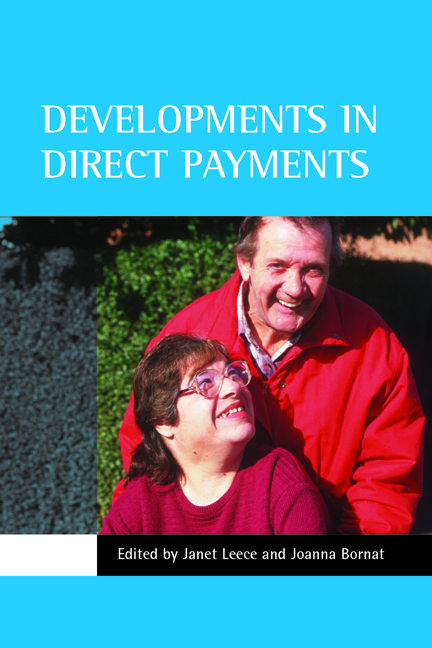Book contents
nineteen - The future of direct payments
Published online by Cambridge University Press: 18 January 2022
Summary
When direct payments were formally introduced in the UK under the 1996 Community Care (Direct Payments) Act, there was considerable resistance in the field, and a range of practical barriers to be overcome. As the chapters in this volume have demonstrated, those keen to promote the take-up of direct payments have had to challenge professional concerns about loss of status; fears about the potential threat to in-house social services; and common assumptions about the inability of certain user groups to manage a direct payments package. As a result, progress to date has been slow and uneven, with some areas of the country lagging behind others and with some user groups massively under-represented among those who currently benefit from the increased choice and control offered by direct payments.
At the same time, achievements to date should not be underestimated. Direct payments were pioneered by disabled people and were only implemented following longstanding, organised pressure from the independent living movement (for a summary of the debate, see Glasby and Littlechild, 2002). However, direct payments have gradually become more and more mainstream, aided by dedicated disabled activists and by user-led centres for independent living. Direct payments were initially introduced only on a restricted and discretionary basis, following research suggesting that they might be more cost-effective than directly provided services (Zarb and Nadash, 1994). They have since been extended to more and more user groups; the number of recipients is constantly growing; and the option has become mandatory, backed by a new performance indicator. By late 2003, the Community Care Minister, Stephen Ladyman, was arguing that:
“The assumption should be not only will care be delivered by a direct payment; the assumption should be that the person can manage a direct payment and the only times when care should be delivered, in my view, other than by a direct payment, is when the individual themselves has made a personal and positive choice to receive the care directly and not via a direct payment.” (NCIL, 2003).
By late 2004, Ladyman was calling for direct payments to be a central feature of social care, with care managers and social services staff ‘immersed’ in direct payments (Community Care, 2004a).
- Type
- Chapter
- Information
- Developments in Direct Payments , pp. 269 - 284Publisher: Bristol University PressPrint publication year: 2006



